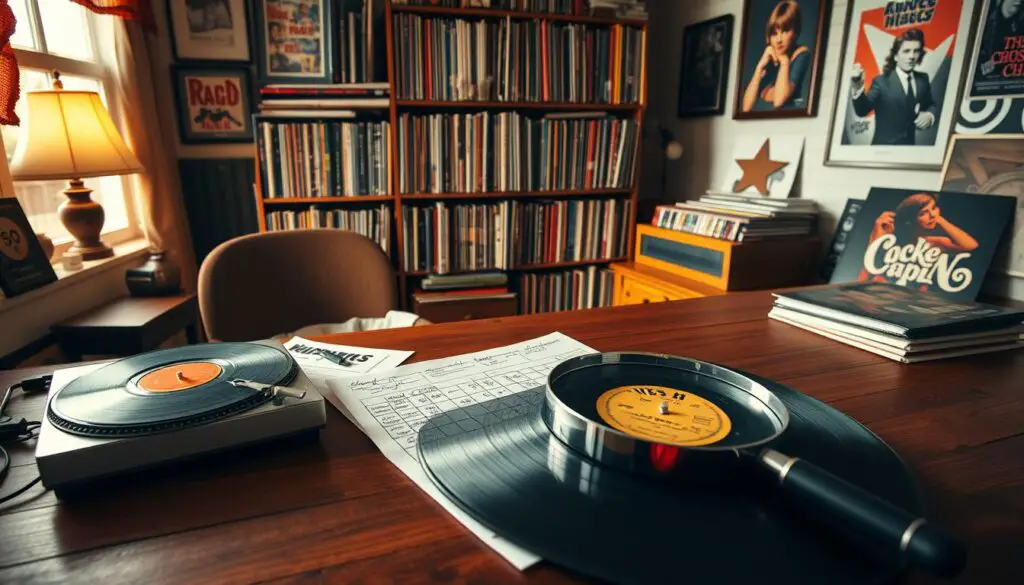If you love music, you might have built a collection of vinyl records over the years. Your collection could be full of rare, vintage albums or a mix of classic hits. Knowing the value of your vinyl can lead to new chances for keeping your collection safe, investing in it, or even selling it. This guide on vinyl record appraisals will show you how to value your records. It covers checking the condition and rarity of your albums, finding a trusted appraiser, and the best ways to sell your vinyl.
Key Takeaways
- Vinyl record appraisals can help you determine the true value of your music collection.
- Factors like condition, rarity, and demand influence the worth of your vinyl records.
- Preparing your collection for appraisal and finding a reputable appraiser are crucial steps.
- Understanding the appraisal process and pricing strategies can help you make informed decisions about your vinyl collection.
- Vinyl record appraisals are essential for insurance, estate planning, and building a valuable collection.
Understanding Vinyl Record Appraisals
Vinyl record appraisals help figure out how much your music collection is worth. They look at the condition, rarity, and demand of your records. This way, you learn how much your vinyl is worth.
Experts check several things when they value your records. They look at:
- Condition and Grading: They check your records for wear, scratches, or damage. These can lower the value.
- Rarity and Demand: How rare your record is and how much people want it matters a lot. Rare records are often more valuable.
They also consider the artist’s fame, the album’s release year, and the condition of the sleeve and packaging. Knowing these things helps you understand your vinyl record appraisals, record valuation, and vintage vinyl pricing.
“Vinyl record collecting is a passionate pursuit, and understanding the true value of your collection is essential. A professional appraisal can provide you with the knowledge and confidence to make informed decisions about your prized possessions.”
Getting your records ready for appraisal and finding a trusted appraiser is important. By learning what affects the value of records, you can make sure your collection is valued right.
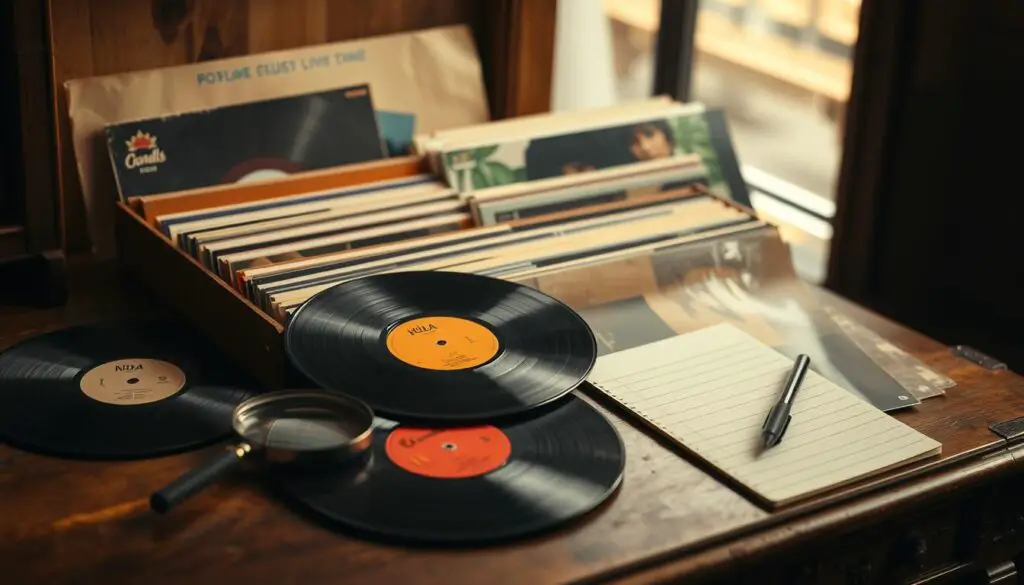
Factors Affecting Vinyl Record Value
When figuring out how much your vinyl records are worth, two main things matter: their condition and how rare they are. Knowing these can help you understand what your records are really worth.
Condition and Grading
The shape of a vinyl record greatly affects its value. Records get a grade from Poor (1) to Mint (10), with higher scores meaning they’re in better shape. Things like scratches, warping, and the state of the original packaging can change a record’s grade and its price.
- Records in great shape with their original sleeves and few signs of wear are the most valuable.
- Records that are used but still in good condition, even with some scratches, can also be worth a lot. This depends on how rare they are and how much people want them.
- Records that are badly damaged or played a lot are usually less valuable because they’re not as desirable.
Rarity and Demand
How rare a record is and how much people want it also play big roles in its value. Records that were made in small numbers, or special editions, and those that collectors really want can cost a lot more.
- Records that were made in small numbers are usually the most valuable.
- Records that have become popular or have a special cult following can also increase in value over time.
- What’s in style and the changing tastes of vinyl fans can also affect how much people want certain records and their prices.
Understanding the role of vinyl record condition, vinyl record grading, vinyl record rarity, and vinyl record demand helps you see what your records are really worth. This knowledge can guide you on what to do with your collection, like keeping it or selling it.
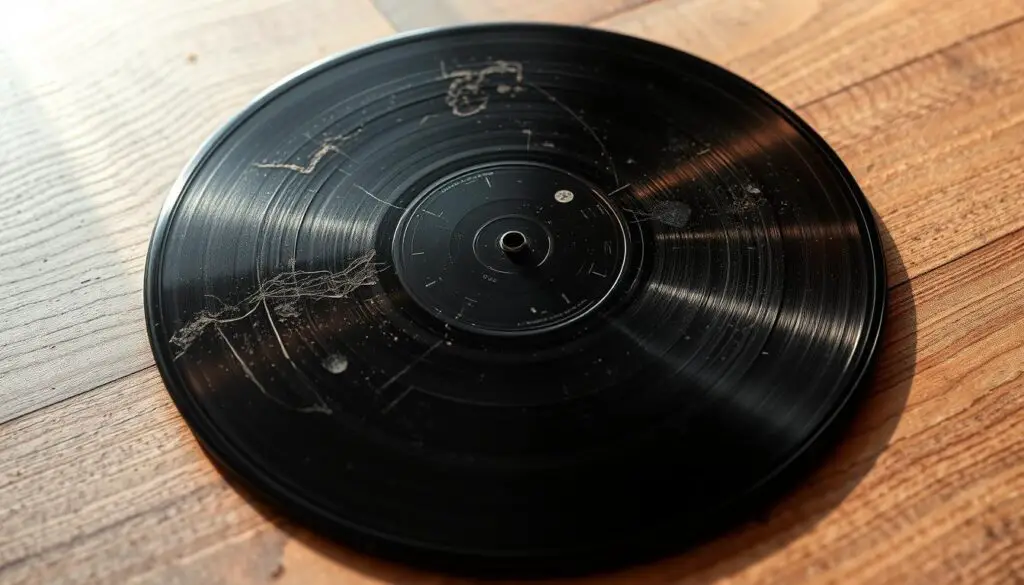
Preparing Your Collection for Appraisal
Before you can have your vinyl records appraised, you need to get them ready. This guide will show you how to check the condition, clean, and organize your records. This makes the appraisal process easier and more accurate.
Vinyl Record Condition Assessment
Start by looking at each record in your collection closely. Look for scratches, scuffs, or any other damage. Check the edges and grooves too, as these can tell you a lot about the record’s condition.
- Gently hold the record up to a light source to check for any blemishes or imperfections.
- Inspect the label for any damage or discoloration.
- Check the record’s overall appearance, noting any unusual markings or signs of wear.
Vinyl Record Cleaning
After checking the condition, clean your records well. Cleaning improves playback quality and keeps the record’s value up. Use a special cleaner and a soft cloth to wipe the record. Be gentle to avoid damaging it.
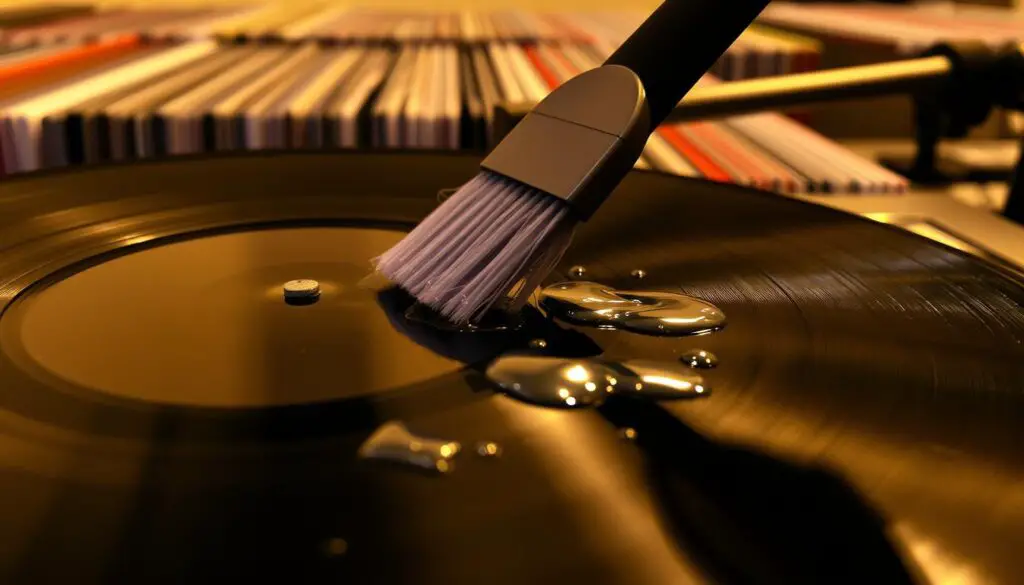
“Proper vinyl record cleaning is essential for maintaining their condition and value. Neglecting this step can lead to a lower appraisal value.”
Organizing Your Collection
Organize your records to make appraisal easy. Put them by genre, artist, or release year. Make sure each record is in its sleeve or jacket and easy to find. This impresses the appraiser and makes the process smoother.
- Sort your records by genre (e.g., rock, jazz, classical).
- Arrange them alphabetically by artist or band name.
- Group together records from the same year or era.
By doing these steps, you’ll make sure your records are ready for appraisal. This can help you get the best value for your music collection.
Finding a Reputable Vinyl Record Appraiser
Choosing the right appraiser for your vinyl records is key. A professional vinyl record appraiser with the right skills and experience can give you a precise and trustworthy value.
Credentials and Experience
Search for professional vinyl record appraisers with formal training and certifications. They should have a lot of experience in the field. This knowledge lets them accurately check your records’ condition, rarity, and demand.
Local vs. Online Appraisers
Choosing between a local vinyl record appraisal or an online vinyl record appraisal service depends on what you need. Local appraisers offer a personal touch and can check your records in person. Online services are great for convenience and give you access to more experts.
The best vinyl record appraiser for you will match your collection’s size, condition, and expertise level. Do your homework and compare your options to find the most accurate and valuable assessment for your records.
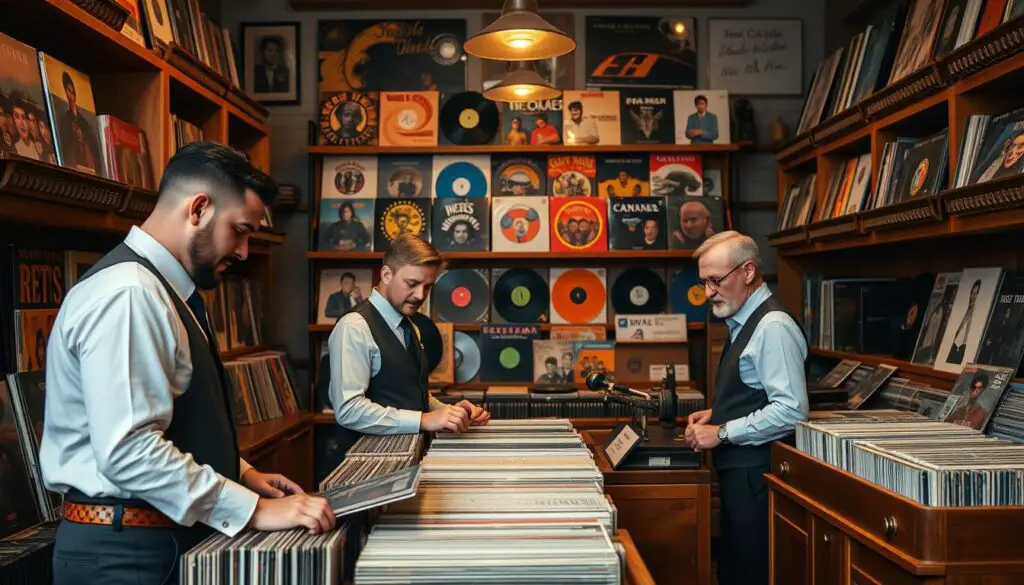
The Appraisal Process Step-by-Step
Learning how to appraise vinyl records is crucial for knowing their value. Experts use a detailed process to check your music collection’s worth. Let’s look at the main steps in appraising vinyl records and what they involve.
The first step is a close look at your vinyl records. The appraiser checks each record for wear, scratches, or damage. They also look at the pressing quality, any defects, and how the record looks.
Then, the appraiser finds out how rare and in demand your records are. They use databases and auction records to see how common the records are and their current prices. This helps figure out what your records are really worth.
- Condition and Grading: The appraiser checks each record and gives it a grade, from “Mint” to “Poor”.
- Rarity and Demand: The appraiser looks into how rare and popular the records are to find their market value.
- Comprehensive Valuation: Using condition and rarity info, the appraiser gives a full value assessment of your vinyl collection.
The last step is sharing the results with you. The appraiser gives a detailed report on your vinyl collection’s value. They highlight the most valuable records and suggest ways to keep your collection safe.
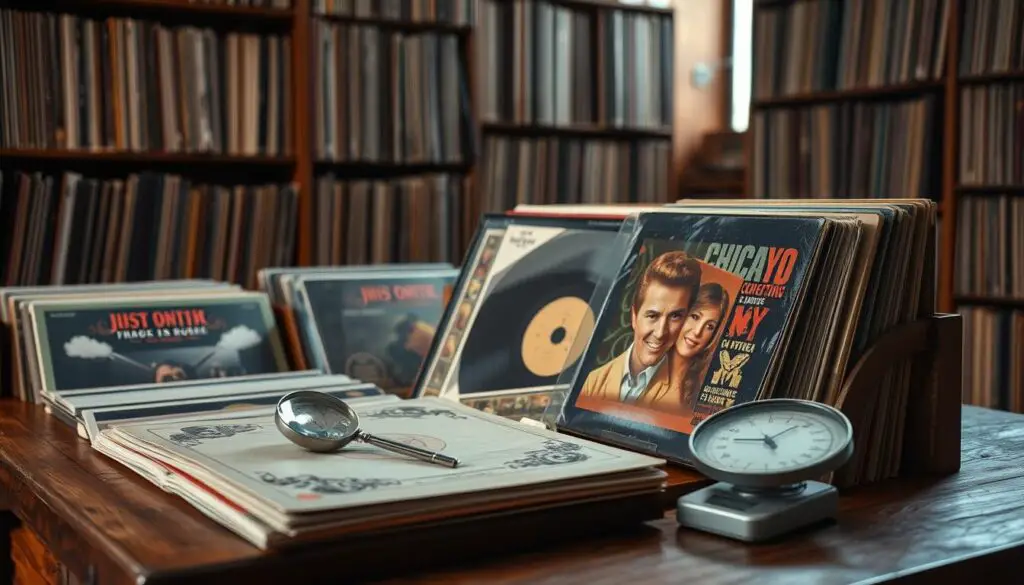
Knowing the steps in vinyl record appraisals helps you prepare your collection. This way, you get a fair and accurate look at what your records are worth.
Pricing and Selling Valued Vinyl Records
After getting your vinyl collection appraised, it’s time to think about selling your records. Selling valuable vinyl can be profitable, whether online or at local stores. It’s important to price them right to get the most money back when selling valuable vinyl records.
Online Vinyl Record Marketplaces
The internet has made it easy to price vinyl records for sale. Sites like Discogs, eBay, and Amazon let you reach buyers all over the world. They have tools like detailed listings, reviews, and safe payment options. This makes it simple to sell valuable vinyl records for a good price.
Local Record Stores
For a more personal touch, try selling your records at a local store. Independent shops often look for rare and hard-to-find records. They can offer fair pricing for vinyl records because they know the market well.
| Selling Channel | Pros | Cons |
|---|---|---|
| Online Marketplaces |
|
|
| Local Record Stores |
|
|
Whether you sell online or at a local store, knowing what affects prices and demand is key. Using the right online vinyl record marketplaces and local store knowledge can help. This way, your records will go to collectors who truly value them.
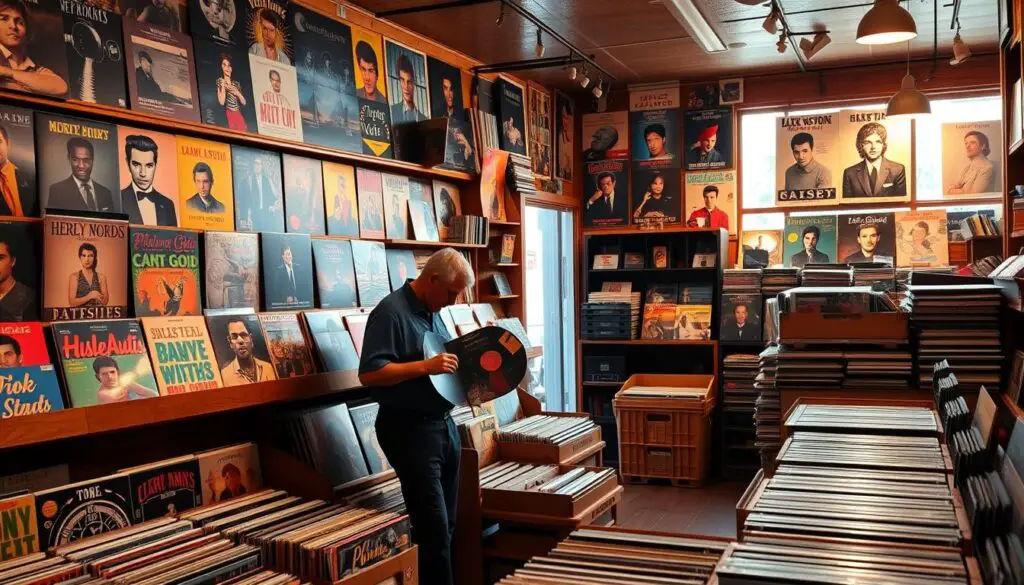
Vinyl Record Appraisals for Insurance and Estate Purposes
Vinyl record appraisals are key for more than just collecting music. They help with insurance and estate planning, making sure your music collection is safe and valued.
For vinyl record appraisals for insurance, a pro can give you the needed proof to cover your records. This is vital for rare or special records that can’t be easily replaced. They figure out your records’ worth, helping you get the right insurance for damage, theft, or other issues.
Also, vinyl record appraisals for estate planning are important for managing your music collection. They help make sure your records are counted right in your will or estate plan. This prevents any disagreements over how much your records are worth.
Lastly, appraising vinyl collections for legal purposes is key in cases like divorce or business deals. A pro assessment gives the facts needed for smart decisions and fair agreements.
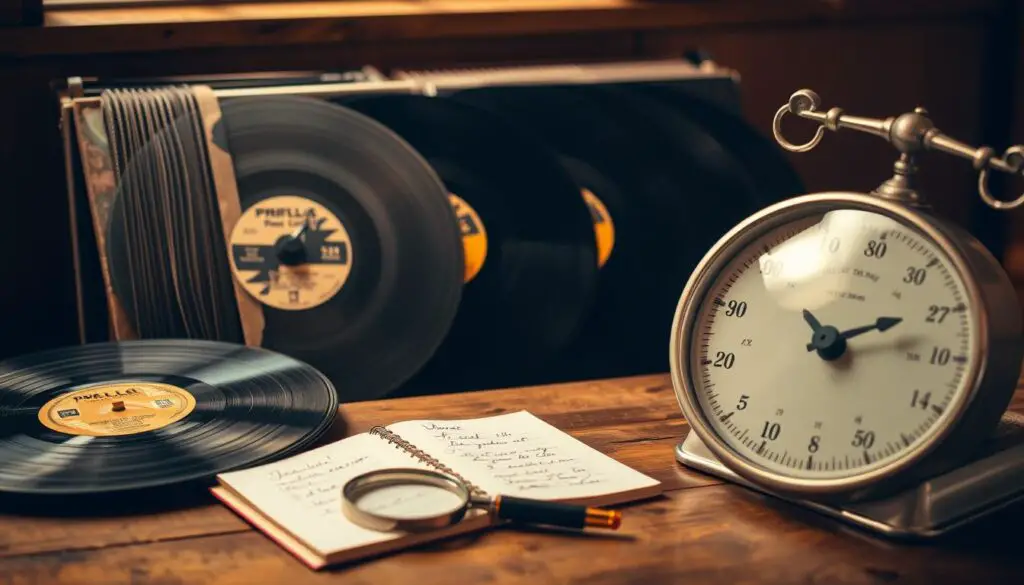
“Vinyl record appraisals are not just for collectors – they’re essential for protecting your musical legacy and ensuring your records are properly valued in legal and financial contexts.”
Caring for and Preserving Valuable Vinyl
Keeping your valuable vinyl records in good condition is key to their value and longevity. By following simple storage and handling tips, you can keep your vinyl records in top shape.
Storage and Handling Tips
Storing your vinyl records right is vital for caring for valuable vinyl records and preserving vinyl record collections. Here are some tips to keep in mind:
- Store records upright in a cool, dry spot, away from sunlight and high humidity.
- Use shelves with dividers to keep records straight and prevent warping.
- Clean records often with a special cleaner and a soft cloth.
- Always handle records by the edges or center hole to avoid scratches.
- Put records in sleeves or inner sleeves to keep them dust-free.
By using these proper vinyl record storage and handling vinyl records tips, your valuable vinyl collection will stay in great shape. This keeps their value and playability for many years.
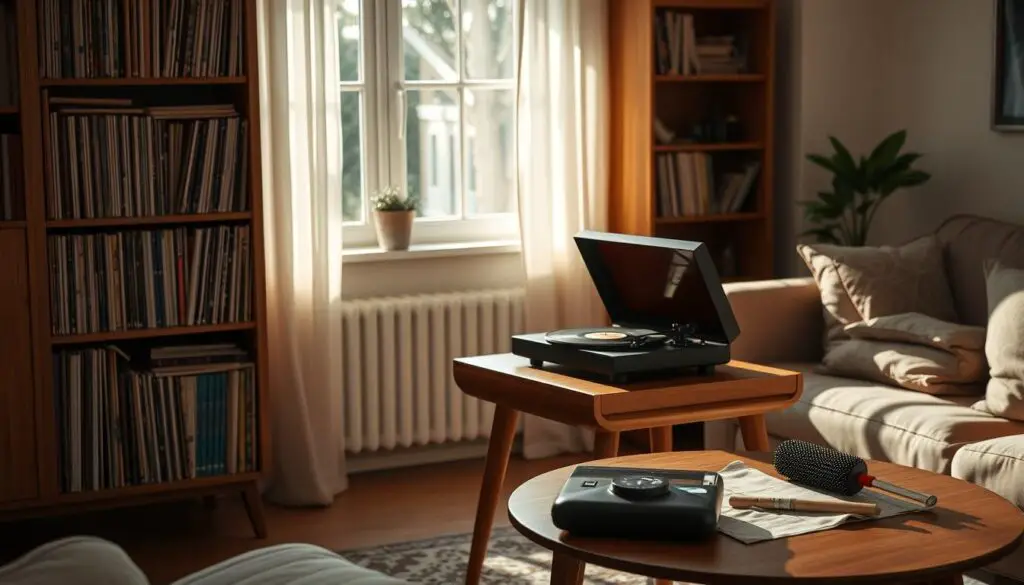
“Vinyl records are a true treasure, and with the right care and attention, they can continue to bring joy and value to music lovers for generations.”
Building a Valuable Vinyl Collection
For those who love vinyl records, collecting them can be both fun and rewarding. Whether you’re starting fresh or adding to what you already have, knowing what makes vinyl valuable can guide your choices. This knowledge helps you find rare finds and make smart buys.
Rarity and demand are key to a valuable collection. Records that are hard to find, like limited editions, are often in high demand. This makes them more valuable. Keeping up with market trends and news helps you spot albums that could increase in value.
The condition and grading of records also matter a lot. Records in great shape, like those in mint condition, keep their value better. Learning to check records carefully helps you avoid paying too much for ones that are damaged.
- Research market trends and industry news to identify rare and in-demand vinyl releases
- Carefully inspect the condition of records before making a purchase, prioritizing mint or near-mint items
- Invest in protective sleeves, storage solutions, and cleaning supplies to maintain the condition of your collection
By focusing on quality, rarity, and demand, you can build a valuable vinyl collection. With time, patience, and an eye for quality, you’ll find the rare gems that make your collection stand out.
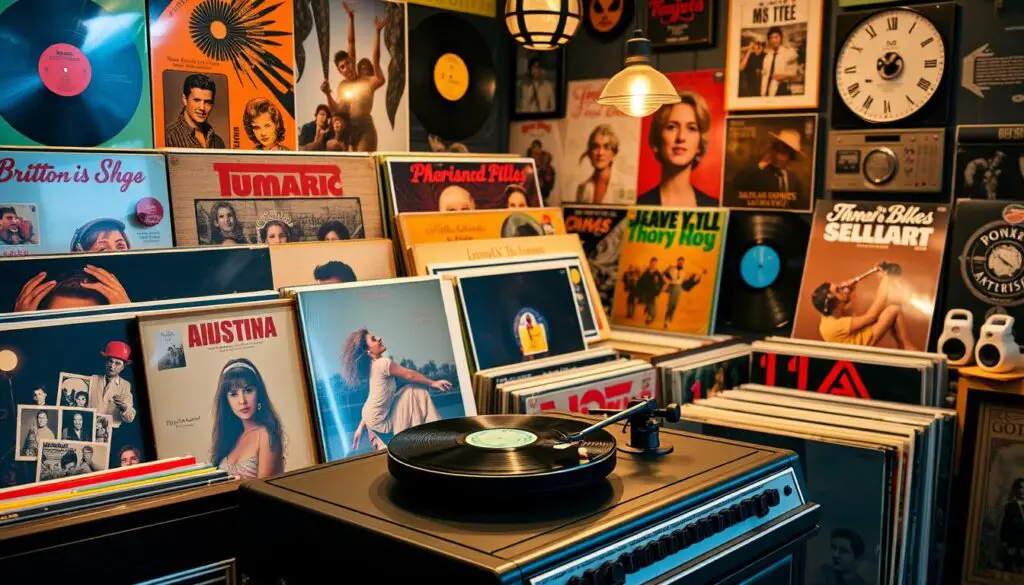
| Vinyl Record Characteristics | Impact on Value |
|---|---|
| Rarity and Demand | Rare pressings, limited editions, and albums with low production runs are highly sought-after and command higher prices |
| Condition and Grading | Well-preserved, mint-condition records typically hold their value better than heavily used or damaged albums |
| Pressing Variations | Certain pressing variations, such as colored vinyl or unique sleeve designs, can add significant value to a record |
Conclusion
In this article, we’ve looked into how to value your vinyl records. We covered the condition, rarity, and demand that affect their worth. Now, you know how to figure out what your vintage vinyl is really worth.
Maybe you want to keep your records safe, sell some, or grow your collection. This article has given you the tools to make smart choices. By working with a trusted appraiser and following the appraisal steps, you can find out what your records are really worth. This opens up new ways to enjoy and share your love for music.
As you keep exploring vinyl records, remember to store and handle them right. This keeps them in good shape and maintains their value. By staying updated and taking care of your records, your collection will always be valuable, both to you and others.
FAQ
What factors determine the value of a vinyl record?
The value of a vinyl record depends on its condition, rarity, and demand. Things like original packaging and pressing variations also play a part. The album’s popularity adds to its worth.
How do I properly prepare my vinyl records for an appraisal?
Start by checking the condition of your records and cleaning them well. Organize your collection to make it easy to check. Keep records of details like pressing info and unique features.
What should I look for when choosing a vinyl record appraiser?
Look for an appraiser with the right credentials and experience. You can pick from local experts or online services, based on your needs and collection size.
How does the vinyl record appraisal process typically work?
First, the appraiser will look over your records. Then, they’ll research the market value of each one. Finally, they’ll give you a detailed valuation of your collection.
What are the best options for selling my valued vinyl records?
After appraisal, you can sell your records online or at local stores. Price them right based on the appraisal to get a fair return.
How can vinyl record appraisals be used for insurance or estate planning purposes?
Appraisals are key for legal and financial needs, like insurance or estate planning. They must meet certain standards and requirements.
What are the best practices for caring for and preserving valuable vinyl records?
Keep your records in a controlled environment and use acid-free sleeves. Handle them carefully to avoid damage.
How can I build a valuable vinyl record collection?
Find rare and sought-after albums and learn about pressing variations. Research the market, connect with collectors, and be patient in your buying. This will help you build a valuable collection.
